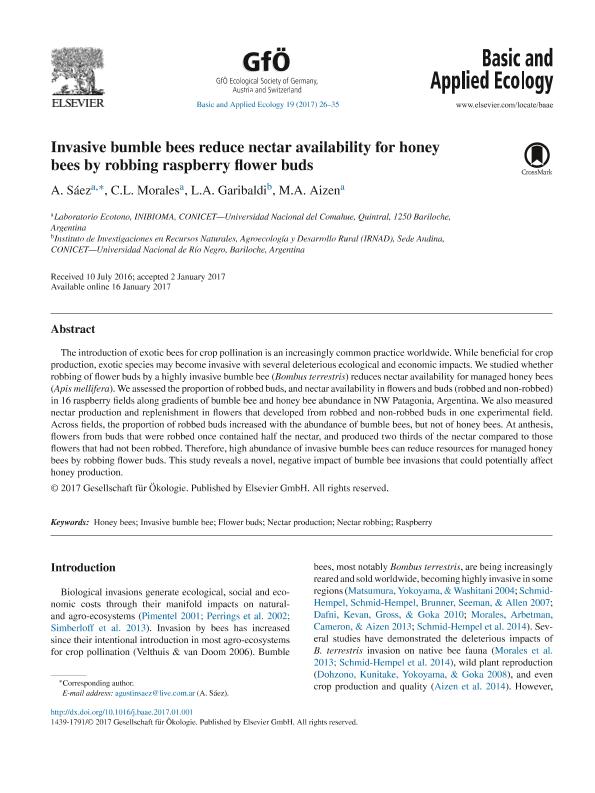Artículo
Invasive bumble bees reduce nectar availability for honey bees by robbing raspberry flower buds
Fecha de publicación:
03/2017
Editorial:
Elsevier Gmbh, Urban & Fischer Verlag
Revista:
Basic and Applied Ecology
ISSN:
1439-1791
Idioma:
Inglés
Tipo de recurso:
Artículo publicado
Clasificación temática:
Resumen
The introduction of exotic bees for crop pollination is an increasingly common practice worldwide. While beneficial for crop production, exotic species may become invasive with several deleterious ecological and economic impacts. We studied whether robbing of flower buds by a highly invasive bumble bee (Bombus terrestris) reduces nectar availability for managed honey bees (Apis mellifera). We assessed the proportion of robbed buds, and nectar availability in flowers and buds (robbed and non-robbed) in 16 raspberry fields along gradients of bumble bee and honey bee abundance in NW Patagonia, Argentina. We also measured nectar production and replenishment in flowers that developed from robbed and non-robbed buds in one experimental field. Across fields, the proportion of robbed buds increased with the abundance of bumble bees, but not of honey bees. At anthesis, flowers from buds that were robbed once contained half the nectar, and produced two thirds of the nectar compared to those flowers that had not been robbed. Therefore, high abundance of invasive bumble bees can reduce resources for managed honey bees by robbing flower buds. This study reveals a novel, negative impact of bumble bee invasions that could potentially affect honey production.
Archivos asociados
Licencia
Identificadores
Colecciones
Articulos(CCT - PATAGONIA NORTE)
Articulos de CTRO.CIENTIFICO TECNOL.CONICET - PATAGONIA NORTE
Articulos de CTRO.CIENTIFICO TECNOL.CONICET - PATAGONIA NORTE
Articulos(INIBIOMA)
Articulos de INST. DE INVEST.EN BIODIVERSIDAD Y MEDIOAMBIENTE
Articulos de INST. DE INVEST.EN BIODIVERSIDAD Y MEDIOAMBIENTE
Citación
Sáez, Agustín; Morales, Carolina Laura; Garibaldi, Lucas Alejandro; Aizen, Marcelo Adrian; Invasive bumble bees reduce nectar availability for honey bees by robbing raspberry flower buds; Elsevier Gmbh, Urban & Fischer Verlag; Basic and Applied Ecology; 19; 3-2017; 26-35
Compartir
Altmétricas




